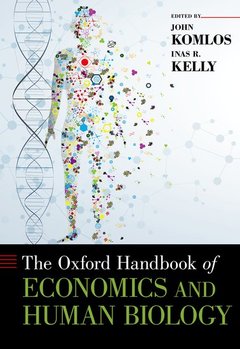The Oxford Handbook of Economics and Human Biology Oxford Handbooks Series
Langue : Anglais
Coordonnateurs : Komlos John, Kelly Inas

The Oxford Handbook of Economics and Human Biology provides an extensive and insightful overview of how economic conditions affect human well-being and how human health influences economic outcomes. Among the topics explored are how variations in height, whether over time, among different socio-economic groups, and in different locations, are important indicators of changes in economic growth and economic development, levels of economic inequality, and economic opportunities for individuals. The book covers a broad geographic range: Africa, Latin and North America, Asia, and Europe. Its temporal scope ranges from the late Iron Age to the present. Taking advantage of recent improvements in data and economic methods, the book also explores how humans' biological conditions influence and are influenced by their economic circumstances, including poverty. Among the issues addressed are how height, body mass index (BMI), and obesity can affect and are affected by productivity, wages, and wealth. How family environment affects health and well-being is examined, as is the importance of both pre-birth and early childhood conditions for subsequent economic outcomes. Reflecting this dynamic and expanding area of research, the volume shows that well-being is a salient aspect of economics, and the new toolkit of evidence from biological living standards enhances understanding of industrialization, commercialization, income distribution, the organization of health care, social status, and the redistributive state affect such human attributes as physical stature, weight, and the obesity epidemic in historical and contemporary populations.
John Komlos is Professor Emeritus of Economics and Economic History at the University of Munich. He has also taught at Duke University, Harvard University, the University of North Carolina at Chapel Hill, and the University of Vienna. He received PhDs in both history and economics from the University of Chicago. Komlos founded the field of Economics and Human Biology with the journal of the same name in 2003. He is among the very few scholars to publish in major journals of five disciplines: economics, history, biology, statistics, and demography. His work has been cited extensively around the globe. Inas R. Kelly is Associate Professor of Economics at Queens College and the City University of New York Graduate Center. She is a research associate in the Health Economics program at the National Bureau of Economic Research (NBER) and has been co-editor of the journal Economics and Human Biology since January 2013. She has published extensively in the field of health economics.
Date de parution : 06-2016
Ouvrage de 848 p.
24.9x17.5 cm
Thème de The Oxford Handbook of Economics and Human Biology :
© 2024 LAVOISIER S.A.S.



